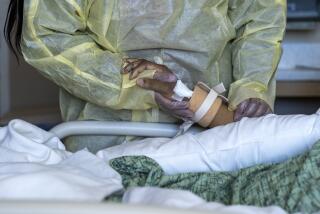She was infected by coronavirus. Her roommate was 71 — and her mother
- Share via
Elisa’s nightmare had become reality. The Los Angeles resident was diagnosed with COVID-19, but she paused before telling her 71-year-old mother about the results, despite the fact that they lived together.
In Elisa’s opinion, the best thing she could do to manage the situation was to not worry her mother — and to keep her at a distance.
(Elisa, a campaign consultant for an Assembly candidate in L.A. County, did not want her last name used because she has not told the rest of her family about the illness and did not want anyone to try to visit out of concern.)
By Tuesday, L.A. County had recorded more than 3,000 confirmed cases and 54 deaths from the disease.
Elisa, 36, had started feeling physically weak March 23; she had a sore throat and dry cough, and her head and body ached. The next day, when she hardly had the strength to move, she decided to drive to an open-air clinic at the Crenshaw Christian Center in South L.A. to get tested.
Elisa, who was born in El Salvador, was sent home to rest. She would have to wait for her results.
But Elisa knew that whatever she had was worse than the bouts of flu and bronchitis she had suffered in the past.
Eventually, Elisa decided to tell her mother that she might have been infected with the coronavirus that causes COVID-19, though she was careful to couch it as an uncertainty. Her mother didn’t believe it. But at that moment, Elisa isolated herself from her mother. (Though COVID-19 has sickened and killed people of different ages, senior citizens are considered to be especially vulnerable.)
“We have a large apartment. I’m in the living room; she’s in her room. If she walks into the kitchen, I won’t go in,” Elisa said. “We wash our hands constantly. If I feel like I’ve been touching my face too much, I wash them.”
In the days that followed, she felt like she had sand in her throat. “I found it hard to breathe, and every time I took a breath I felt pain shoot through my chest and lungs,” Elisa said in a phone call. “I take a few steps and I feel weak.”
Among her symptoms: waves of nausea, loss of appetite, vomiting and stomachaches; her tongue became swollen, with a white coat over it that caused her to constantly wash out her mouth.
On Monday, Elisa’s suspicions were confirmed when she got the results of her test. She had COVID-19. On Tuesday, she told her mother that there was no longer any doubt.
For the better part of a week, Elisa had been sure she was ill with COVID-19. But she didn’t want to worry her mother if there was any chance that she wasn’t.
“All this time I’ve taken precautions so that I don’t infect her. I didn’t tell her [that I felt certain about the illness] because I didn’t want to worry her. I didn’t want her to have thoughts in her head that she might have the virus,” Elisa said. “I wanted her to see me getting better and to think that if I was getting better, then she would too if she were to also get ill.”
Her mother’s response to the news was bittersweet. “She’s worried but relieved that she doesn’t have the symptoms,” Elisa said. “And that I’m coming out of this.”
More than eight days since she got ill, Elisa still has no idea how she got exposed to the coronavirus.
Between March 11 and March 14, she was at an event for personal development at a hotel near Los Angeles International Airport. There were more than 200 people in one hall; organizers were checking the temperatures of people who arrived, she said.
On the third day, Elisa said, the event was canceled because one person turned out to have pneumonia, according to a message she received later.
In the next days, Elisa went hiking in nearby mountains and went to various stores to buy food. “I can’t say with certainty how or when I was infected,” she said.
But Elisa said she feels fortunate that she had stopped working the first week of March — keeping her away from co-workers.
For her part, her mother was laid off from her job as a housekeeper March 16.
“I’ve had anxiety attacks … but what has kept me from panicking is official announcements that say that the majority of people recuperate,” Elisa said.
Her advice: Don’t panic. Monitor your symptoms and see how your body reacts to them. She said she’s trying to stay positive and keep her mother feeling the same way.
“Of course, you always worry about money during these times,” Elisa said. “But when you’ve been in this position, you realize that your health is the most important thing.”
More to Read
Sign up for Essential California
The most important California stories and recommendations in your inbox every morning.
You may occasionally receive promotional content from the Los Angeles Times.











